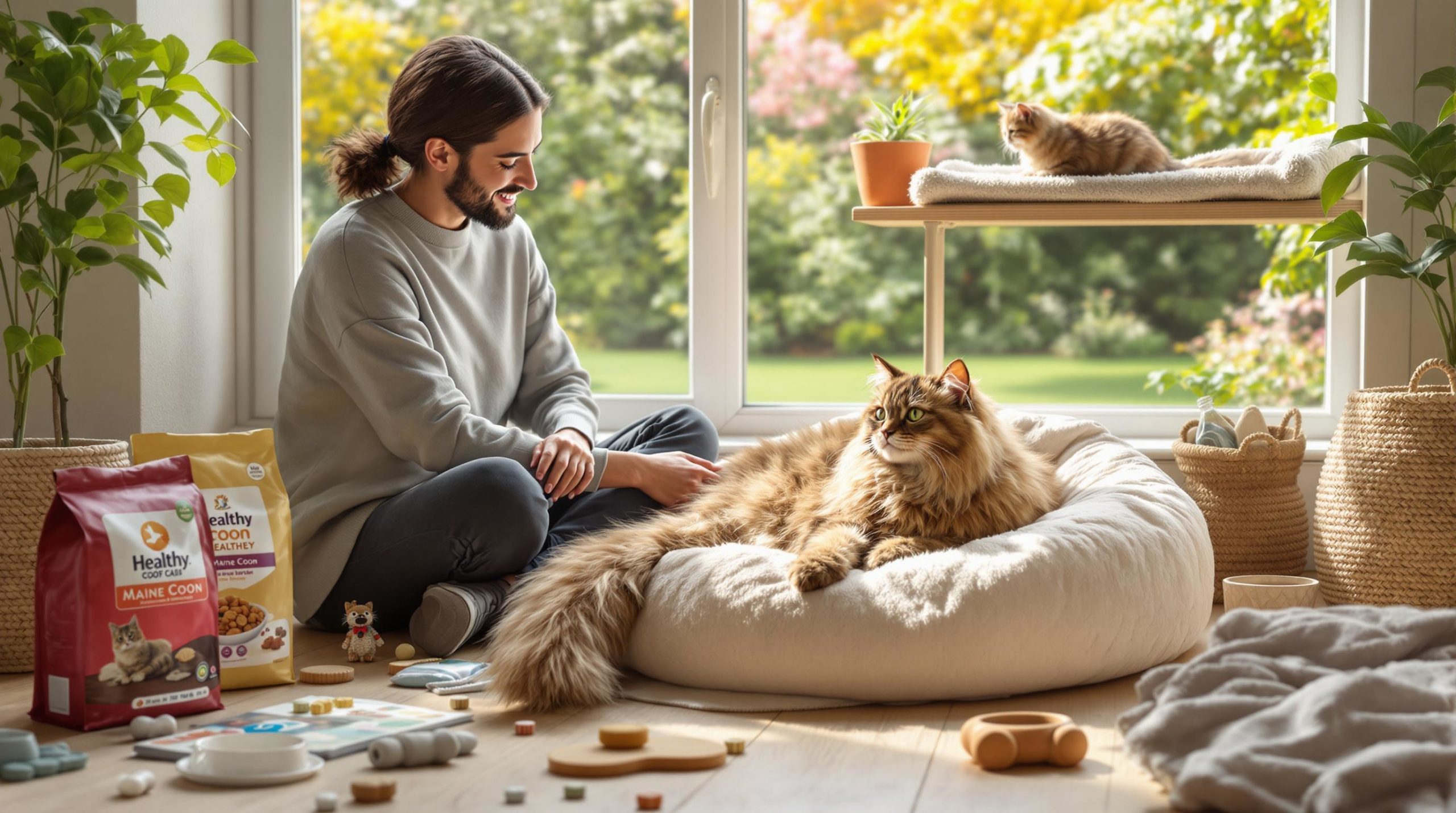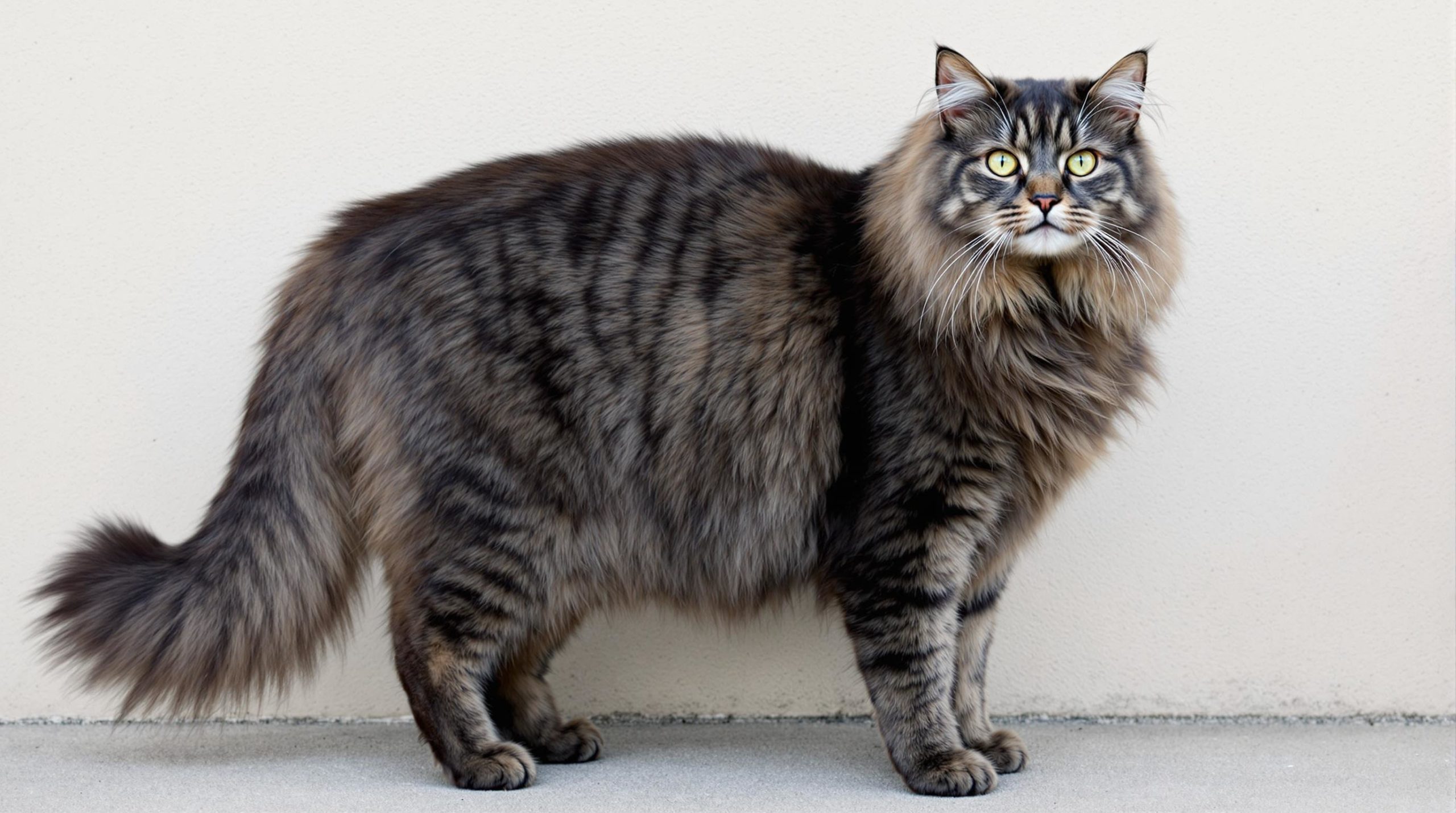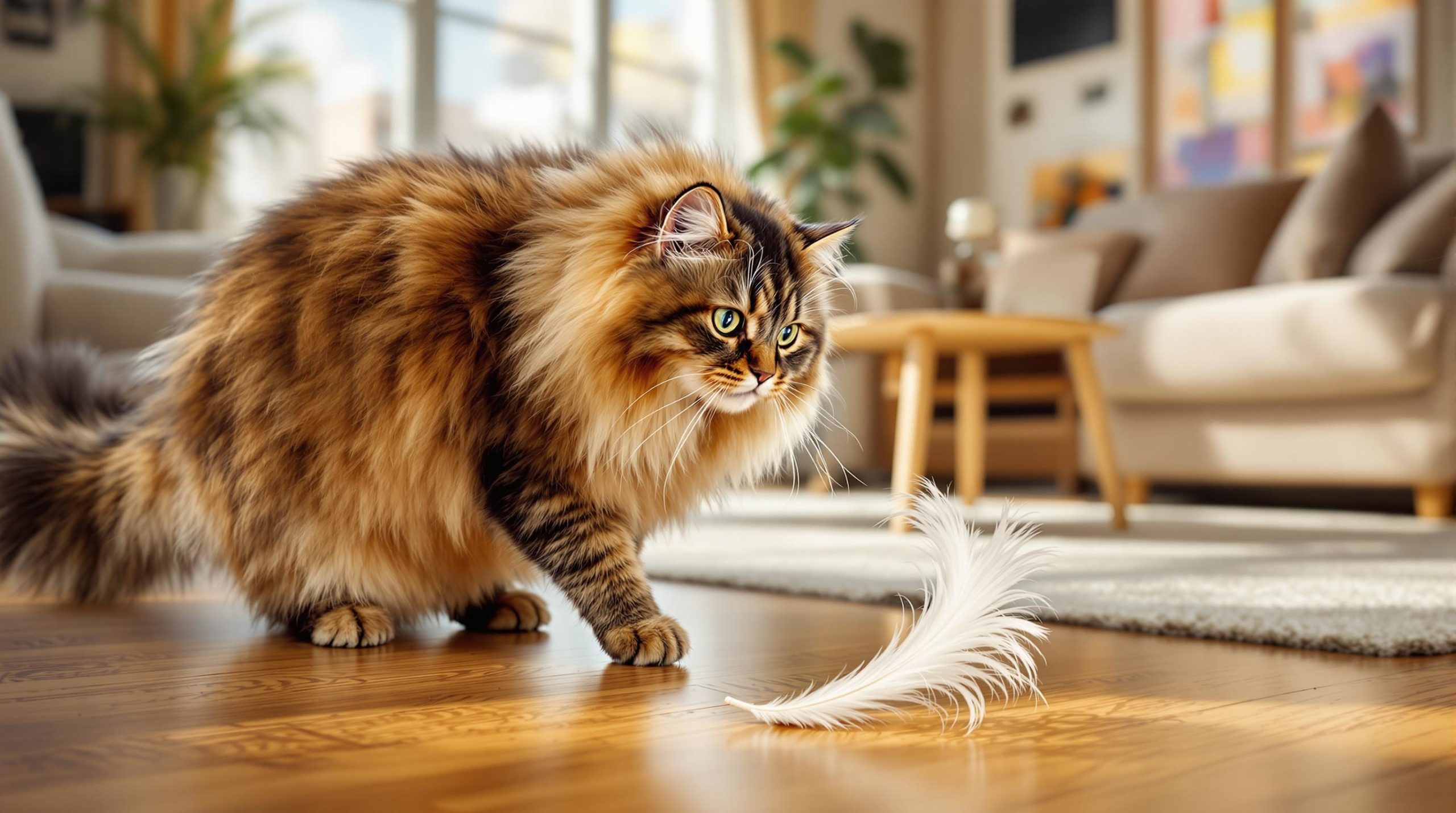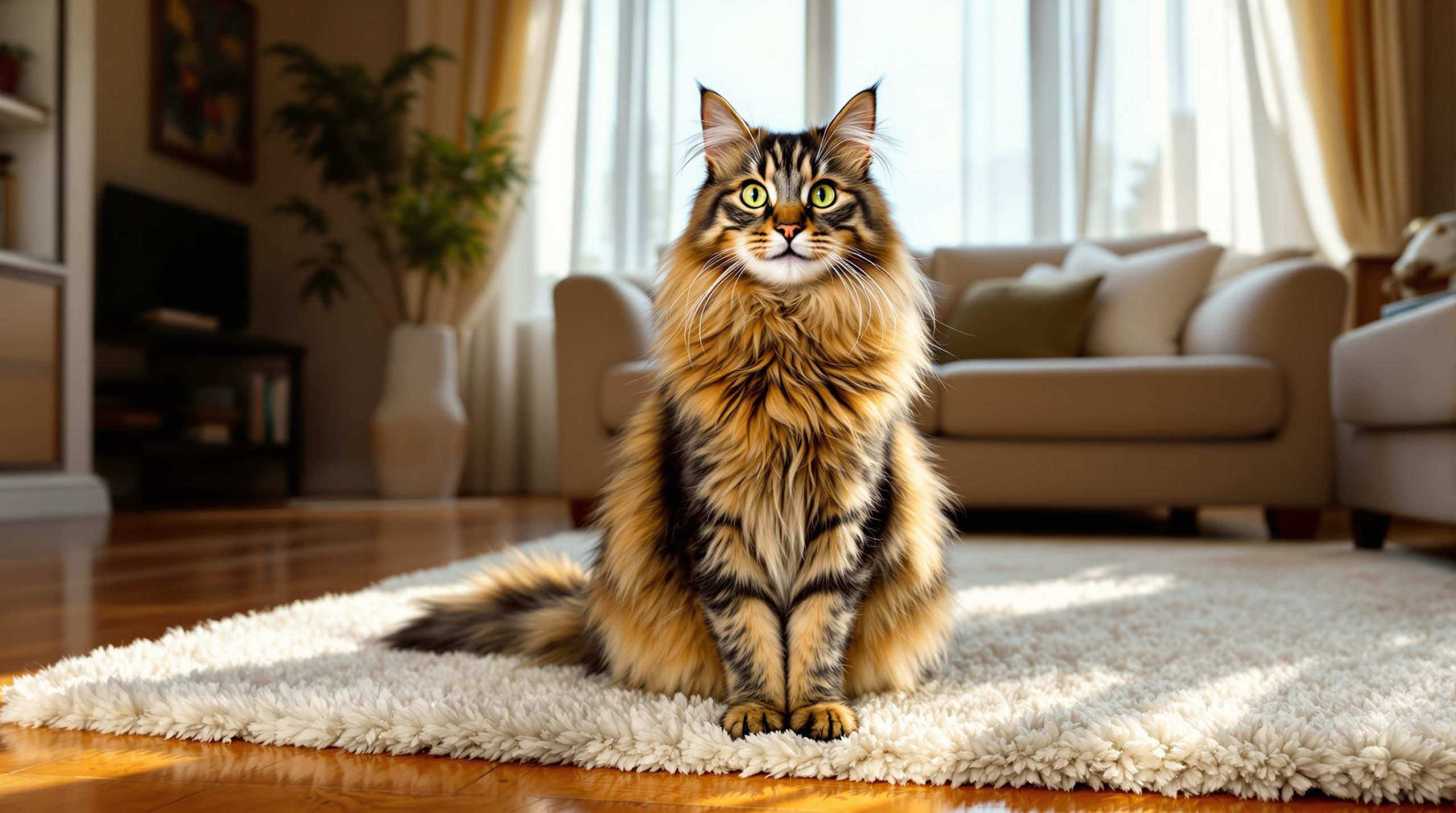Understanding the best practices for caring for overweight Maine Coons

When it comes to Maine Coon Cat Care, a frequent misunderstanding is mistaking an overweight Maine Coon for a healthy one. This big and fluffy breed naturally appears large, yet the risks associated with excess weight are significant. Studies from recent years highlight that nearly a third of cat owners fail to recognize when their feline friends are overweight, inviting a slew of Feline Health Solutions concerns such as diabetes, arthritis, and cardiovascular problems. Heightened awareness and effective Weight Management for Cats are essential to preserving the vitality and longevity of these majestic companions. This guide breaks down proven techniques for monitoring their health, with a focus on Pet Nutrition Essentials, Veterinary Care Services, and stimulating activity through Interactive Cat Toys and Cat Exercise Equipment to help ensure balanced well-being.
Recognizing Healthy and Overweight Maine Coons: Weight Metrics and Physical Assessment
Determining the ideal physique for Maine Coons requires considering their unique growth pattern and genetic variation. Unlike many other breeds, Maine Coons may take up to four years to reach full size, leading to a wide range of normal weights. Adult males generally range between 17 to 27 pounds, while females weigh between 11 and 16 pounds. However, the actual healthy weight hinges on individual genetics and lifestyle factors.
| Age | Female Weight Range | Male Weight Range |
|---|---|---|
| < 1 year | 9-12 lbs | 13-19 lbs |
| 2-3 years | 10-14 lbs | 15-25 lbs |
| 4 years and older | 11-16 lbs | 17-27 lbs |
Since Maine Coons carry thick fur, their body size can mislead owners about their true weight status. The best way to begin a health evaluation at home includes:
- Rib cage palpation: Feeling the ribs with gentle pressure should reveal some rib texture; excessive fat obscures this, signaling overweight.
- Examining the abdominal area: Noticeable sagging or prominent belly bulges often reveal excess fat deposits.
- Body contours: Viewing from above, a round back and broad torso typically indicate weight issues, especially in short-haired cats.
- Regular weighing: Using an electronic scale keeps ongoing tabs on weight progress or setbacks.
This physical check is a good initial step before consulting with a professional on your Maine Coon’s body condition score, which remains a reliable Veterinary Care Service. Identifying and catching excessive weight early is critical to preventing complications like joint strain or metabolic disease.

Pet Nutrition Essentials to Support Weight Control in Maine Coons
The foundation of effective Weight Management for Cats lies in strategic nutritional choices. Maine Coons are large, muscular cats with specific dietary needs, making it vital to select food aligned with their health goals. Choose Quality Cat Food Brands that emphasize:
- High protein levels: Proteins should dominate the ingredient list, with recognizable sources like chicken, turkey, or fish as the first elements.
- Moderate fats: Healthy fats support coat and skin quality but should be balanced to avoid excess calories.
- Limited carbohydrates: Exclude fillers such as corn, wheat, and soy, which contribute to unnecessary calorie intake.
- Complete and balanced formulas: This ensures Maine Coons receive essential nutrients even within weight control diets.
Weight reduction diets crafted for feline weight care often contain more fiber to promote a feeling of fullness without additional calories. Wet foods may be preferential due to their high moisture content helping satiety and hydration. However, switching diets should always be a well-managed process involving Veterinary Care Services to monitor transitions and avoid nutritional deficiencies.
Feeding regimens should reflect the cat’s daily caloric needs calculated according to current body weight and activity levels. On average, adult Maine Coons expend between 25-35 calories per pound daily, with overweight cats requiring adjustments to achieve gradual, safe weight loss — typically aiming for 1-2% of total body weight per month.
| Weight (lbs) | Calories Needed Per Day |
|---|---|
| 10 | 250-350 |
| 15 | 375-525 |
| 20 | 500-700 |
| 25 | 625-875 |
Portion control remains critical; giving multiple small servings a day rather than a few large ones prevents hunger pangs and begging behavior. Incorporating Maine Coon Specific Products like formulated bowls or automatic feeders can aid in maintaining appropriate meal sizes.
Encouraging Physical Activity and Mental Stimulation through Enrichment
While nutrition plays a fundamental role, supporting a Maine Coon’s weight also demands adequate exercise. Despite their reputation for playful and active behavior, Maine Coons can become sedentary, especially indoor cats. Providing stimulating environments with interactive opportunities is necessary to boost activity.
Key components for successful activity enhancement include:
- Interactive Cat Toys: Toys triggering hunting behavior, such as feather teasers and robotic mice, encourage bursts of chases and pounces, effectively burning calories.
- Cat Exercise Equipment: Structures like cat trees, climbing posts, and ramps promote climbing and jumping.
- Outdoor Access: Safe walkways or harness walks offer fresh stimulation and exercise.
- Scheduled Playtime: Engaging in daily play sessions lasting 30 minutes reduces boredom and combats weight gain.
Overweight Maine Coons benefit from incremental increases in activity, aiming to extend playtime gradually by 10-15 minutes. This helps their metabolism adjust and provides mental health benefits. Importantly, a lively, engaged cat is less likely to obsess over food, improving portion adherence and long-term success.

The Role of Veterinary Care and Regular Monitoring in Managing Obesity
Integrating Veterinary Care Services into a Maine Coon’s weight management strategy is indispensable. Professional input not only ensures accurate assessment but also identifies underlying health issues contributing to weight gain, such as metabolic or thyroid disorders. Regular veterinary visits involve:
- Body Condition Scoring: Assigning a numerical score to evaluate the cat’s fat coverage, muscle tone, and body shape.
- Health Screening: Blood tests to check for diabetes, kidney problems, or other systemic diseases aggravated by excess weight.
- Customized Weight Loss Plans: Caloric targets, feeding recommendations, and exercise regimens tailored to the individual cat.
- Behavioral Advice: Tips to modify feeding habits, treat frequency, and activity encouragement.
Regular weighing, ideally monthly, provides tangible progress feedback and an early warning system for potential weight fluctuations. Cooperation between pet owners and veterinarians is key to navigating challenges and maintaining a sustainable lifestyle adjustment.
Dedicated Maine Coon enthusiasts and breeders, as discussed in resources on care for fat Maine Coons, often stress early intervention to avoid entangling their cats in chronic diseases later in life. Establishing good routines related to health monitoring paves the way for increased longevity and quality of life.
Supporting the Holistic Well-being of Your Maine Coon: Grooming, Environment, and Emotional Health
Weight management is intertwined with other facets of Maine Coon Cat Care beyond diet and exercise. Maintaining a comprehensive and nurturing environment solidifies their overall Feline Health Solutions. Consider these crucial areas:
- Pet Grooming Tools: Regular brushing helps remove excess fur, revealing body contours crucial for weight assessment and mitigating matting common in overweight cats.
- Calming Environments: Stress can manifest physically; providing quiet spaces and secure perches reduces anxiety and associated overeating.
- Social Interaction: Maine Coons thrive on engagement with humans and other pets, which supports mental stimulation and activity motivation.
- Environmental Enrichment: Incorporate Maine Coon Specific Products such as personalized cat condos and puzzle feeders to challenge intellect and keep boredom at bay.
Incorporating these dimensions secures a balanced upkeep approach, ensuring your feline friend feels comfortable, loved, and well cared for. Avoiding the pitfalls of obesity requires more than basics; it demands an integrated system of responsible feeding, proactive exercise, attentive healthcare, and emotional well-being consideration.
For additional details on breed personality and health predispositions impacting weight management, exploring comprehensive guides like Maine Coon personality insights and health problems in Maine Coons is highly recommended. For new or prospective owners, understanding the cost and care commitments of Maine Coon ownership helps align expectations and resources to support best care practices.

Frequently Asked Questions about Caring for Overweight Maine Coons
- How often should I weigh my Maine Coon to monitor weight changes?
Monthly weighing is advisable to catch early trends and adjust diet or exercise as needed. - Can indoor Maine Coons maintain a healthy weight without outdoor access?
Yes, with proper exercise toys and dedicated playtime indoors, indoor cats can remain fit. - Is wet cat food better for weight management than dry food?
Generally, wet food helps with satiety due to higher moisture content, improving portion control and hydration. - What are signs that my Maine Coon might be obese?
Difficulty feeling ribs, a saggy belly, and rounded body shape from above are common indicators. - How can I handle my cat’s food begging without overfeeding?
Dividing total daily calories into multiple small meals and enriching mealtime with toys or puzzle feeders can reduce begging behavior.